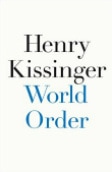World Order
Circling the globe with Henry Kissinger.
World Order. By Henry Kissinger. Penguin Press, New York, 2014. 432 pp.
Henry Kissinger divides the world geographically, but analyzes it through a cultural lens. He presents as a series of “reflections” in World Order a journey from the moment that the world’s powers agreed on “an order” to organize international relations—the signing of the Treaty of Westphalia in 1648 at the end of the Thirty Years War—through to our current day.
The objective of the journey is not to prove that one “order” is superior to another, but to argue that “an order” is needed for the world to avert a descent into chaos. The last section of the book—in which Kissinger reflects on the impact of modern communications, the Internet and social media, on the notion of state sovereignty, human privacy, and societies’ cohesion—revolves around his unshakeable belief that the world needs an order through which states interact with one another. Though he does not say so directly, he sees the Internet’s evaporation of barriers among societies, and its gradual changing of individuals’ sense of belonging, as potentially threatening to political, economic, and social stability. He subtly supports the need for regulating this virtual world, which, in his view, if left unstructured, could usher in an era of utter disarray in the functioning of societies.
Kissinger, of course, is savvy enough to refrain from putting forward propositions regarding who is to effect this regulation—or how. This point aside, his apprehension about the way the Internet is changing social functioning lies in his skepticism of humans’ reasoning and their ability to control their behavior in a world in which the virtual will increasingly merge with the psychical. Kissinger also asserts that he is skeptical of the ability of political leaders to rise above the pressures that the Internet and social media place on their decision-making processes. There is a real danger of politics becoming a theater of managing perceptions, judged by the number of Twitter followers and ‘Likes’ rather than decision-making processes that, in theory at least, maximize the general benefit of a certain nation. Throughout this section, Kissinger throws various concerns at the reader, without venturing any answers. What he manages, successfully, is to put forward the alarm of a political scientist and policymaker over the changes that the Internet is causing in our lives, without sounding like an old man, grumpy about the changes taking place around him.
In the rest of the book, Kissinger goes beyond posing questions and airing concerns. In discrete chapters, he dissects how the American, Chinese, European, Indian, Islamic, Japanese, and Russian views of world order developed. His approach is consistent; he identifies the formative and transformative experiences that each of these societies went through; he pauses at the roles played by key historical figures; and he delves into the unique features of these societies’ cultures. His points are almost always insightful; and his flows—the links he makes between the experiences, the leaders’ roles, the cultural heritages, and the traumas that societies had experienced—are gracefully logical. But they are selective.
In each of the chapters, Kissinger picks and chooses what he sees as the important historical experiences, the individuals worth mentioning, and the challenges that merit reflection. Other observers might well choose different historical episodes, leaders, and traumas. By default, Kissinger’s analyses of these different views of “order” are incomplete.
They are also distinctly American. For an observer of Kissinger’s stature, it is surprising that his views do not have the detachment expected from someone with his command of history and long experience in international affairs. His Americanness is a bit old-fashioned. Whereas most modern American strategists imbue their narratives with serious examination of U.S. foreign policy since the end of World War II, his reflection on America’s view of “world order” lacks any real criticism of the legacy of America’s projection of power in the last seven decades. This makes his narrative less genuine. Crucially, there are few lessons for American decision-makers.
Contrast this with Kissinger’s discussion of the Chinese perspective. He draws upon his assessments of Chinese history, culture, and power structure in his previous book On China. His arguments and tone are respectful, acknowledging the weight and burden of China’s colossal experience in shaping its view of “world order.” But in reflecting on its trajectory in the twentieth century, he is frank, laying blame when and where it is due, most notably on Mao Zedong’s disastrous socioeconomic policies that led to the great famine and loss of millions of lives. Kissinger does the same with other nations’ experiences, such as India’s persistent adherence to a statist socialist model that stifled Indian entrepreneurship under the weight of a gigantic and lethargic state structure. And so his analysis of America’s experience of the last seven decades, by comparison, comes across as at best charitable and at worst disingenuous.
Kissinger’s presentation of Islam’s view of “world order” is intriguing. He anchors it on a distinction made by some Islamic scholars of Dar Al-Silm (the abode of peace, Islam’s own lands) and Dar Al-Harb (the abode of war, the rest of the world). He uses this as the launching pad to dissect why Islam, in his assessment, has never—and will never—accept any other “order.” At the beginning of the chapter on Islam, Kissinger makes a subtle caveat that the views he picks represent but one of the many that have shaped Islamic thinking and engagement with the world. The caveat is admirable and correct. But it does not answer the question of why he chose that specific point to represent the Islamic perspective, from the very rich and diverse views of the world that scores of Islamic schools of thinking have produced over the past centuries. The likely answer is that Kissinger chose a school of Islamic thinking that reflects, in his view at least, the most potent force in the Islamic World at the moment. If true, it means that Kissinger regards groups such as the Islamic State in Iraq and Syria and other Salafist jihadists as the ones representing the majority of Muslims today and that are likely to shape the future of Islam’s engagement with the world.
Interestingly, Kissinger also makes a distinction between the Islamic perspective and the Iranian one. I suspect that this is driven by two factors. The first is his fascination with “cultures.” The Persian civilization is beguiling; it entails a unique view of the world, placing Persia at the center of the civilized world, and measuring others’ refinement through their proximity to Persianness. This culture was arguably the strongest within the Islamic World. It is the single major civilization that chose to embrace Islam without sacrificing its own language for Arabic. The second reason is probably Kissinger’s own experience. Throughout the 1970s, Kissinger was the architect of America’s relationship with Shah Mohammad Reza Pahlavi. He got to know the man, his family, his history, his country, and what drove his worldview. Though Kissinger became relatively close to Egypt’s Anwar Sadat, too, his experience in dealing with the Shah and Iran was much longer, more intense, and arguably more personal than any of his dealings in the Arab World. And yet, these two factors, even if true, fail to acknowledge that the Islamic civilization is an amalgamation of various cultures, and worldviews, including that of Persia.
Having said that, by choosing to focus on the Islamic binary between peace and war, by singling out Salafist jihadism as a decisive force in the Islamic World today, and by separating the refinement of the Persian World from the rest of the Islamic World, Kissinger forces the readers who culturally belong to the Islamic World to stare at the threat they confront. When it comes to the Islamic World, Kissinger is not raising a red flag regarding violence. He is not an alarmist, and does not subscribe to the hysteria regarding the Islamization of Europe. His thesis is more subtle. He argues that the Islamic World is slowly being driven, by Muslims, out of the international system.
Tarek Osman is a political economist focused on the Arab World and is the author of Egypt on the Brink. He was the writer and presenter of the BBC’s 2013 radio series “The Making of the Modern Arab World” and the 2015 radio series “Saudi Arabia: Sands of Time.” He is the political counselor for the Arab World at the European Bank for Reconstruction and Development. On Twitter:@TarekmOsman.
Subscribe to Our Newsletter






